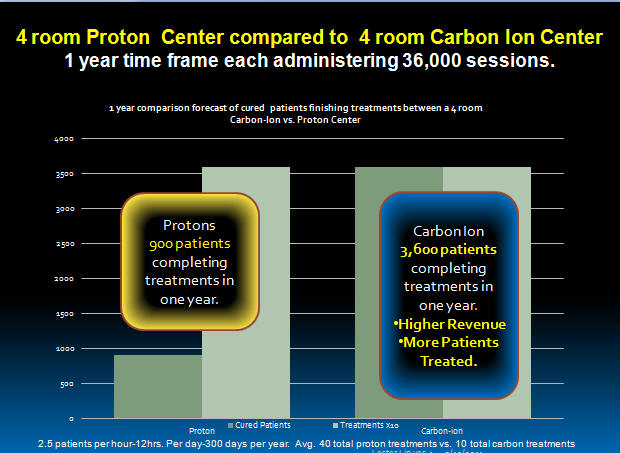The Questions of Synchrotron Accelerators vs. Cyclotrons, and Carbon Ions vs. Protons.
These
are questions that
every procurement and planning team, administrator and technologist,
physicist and physician should
be asking today.
Past, Present, and Future
Cyclotrons have been successfully used in this industry to accelerate protons for medical treatment. Until now, cyclotron based proton systems have been a logical choice. That is the PAST.
PRESENTLY, the face of this industry is in a dynamic stage of transformation. For the past 16 years, the use of carbon ions in the fight against cancer has been steadily proving what the laws of physics have always told us. Carbon Ions are 12 times bigger and heavier than Protons. When fighting cancer, the goal is to make double breaks in the DNA strands. The greater energy and size of Carbon Ions increases their capability to accomplish this mission. Today, the increased efficacy of Carbon Ions vs. Protons is no longer in question. The evidence is obvious.
New cancer centers looking into the FUTURE must take into account the trend of the industry shifting towards the application of Carbon Ions to fight cancer. With over 10 times the cancer killing energy than protons, this technology, available today, cannot be ignored in the future.
Bowling Balls vs. Baseballs:
Maybe an analogy of going bowling with a baseball compared to bowling with a full size bowling ball could illustrate the point. The bowling ball is bigger, heavier and more efficient in knocking down the pins than a baseball. It will get the job done with less well placed throws. The baseball is capable of doing the job, but since it is lighter and smaller, at best, it will take many more tries, and much more time to do the same mission. Of course Carbon Ions are like the bigger, heavier bowling ball. The bowling pins represent the cancer cells that need to be knocked out. The baseball is like using Protons to knock down the pins.
Clinical Results of Carbon Ion Treatment:
The clinical
results from over 8,000 patients treated with Carbon Ions over
the past 16 years, have now brought the industry to a
tipping point. Huge investments have been,
and are being made
to build full Carbon Ion clinical
cancer centers, each capable of treating
thousands of patients per year in Japan, Germany, and China.
These centers have started coming online in 2010, and continue to
grow in numbers. The reason
is that the incredible results
using carbon ions have spoken for themselves.
Compared to protons, carbon ions reducee
the
required number of treatments by a factor of 2
to 40 times!
The
economics and the shere increased number of patients that a
Carbon Ion center can potentially treat, are
just impossible to ignore.
The shortened treatment time period and reduced number of
treatments results in much less stress for the patient.
Tough Choices for New Cancer Centers Making Hardware Decisions
Today.
Today, cancer
centers face the dilemma that if they build a straight proton system
using cyclotrons, they have no way to upgrade to a synchrotron Carbon
Ion system. They will be
left in the dust with older technology.
This could mean that it will be much harder to compete
financially and technologically in the future against Carbon Ion
treatment.
Bragg Peak
addresses this dilemma with our upgradable synchrotron systems.
A center
currently
without enough budget to procure a full blown carbon
ion system, can start with protons today, and upgrade to carbon ions in
the future. The cancer
center is assured that it can keep up with technological advances in
this field, and stay competitive financially, technically, clinically
and academically in the future.
Pitfalls of using Cyclotrons for Accelerating Carbon Ions
Current
research is ongoing in the use of cyclotrons to accelerate carbon ions.
However accelerating protons from the center of a cyclotron to
half the speed of light compared to accelerating carbon ions with so
much more mass has been an elusive challenge.
Stability, technical and reliability issues, and even maintenance
issues in the future hang as a big question mark over the ability of
cyclotrons to accelerate carbon ions in a clinical setting..
Scientists
have been trying to resolve technical issues
related to using
cyclotrons to accelerate carbon ions for the
past 10 years, and are not yet close to the stability and reliability
levels required for clinical usage.
Advantages of using Synchrotrons to Accelerate Carbon Ions.
On
the other hand, accelerating protons and carbon ions with synchrotrons
is technically straightforward.
Synchrotrons have been used to accelerate carbon ions at the
levels appropriate to medical
usage for decades already.
It is reliable, proven
technology. Currently, large
synchrotrons and colliders
accelerate particles at 10,000 times the energy needed for medical
usage.
This is why Bragg Peak is solidly behind bringing
an FDA approved Carbon Ion system to market powered by synchrotron
accelerators. It is the
best, most reliable and safest choice available today, and for a long
time to come.
Conclusion:
Bragg Peak Systems offers
Bragg Peak Systems. The logical choice today, when considering the future.


